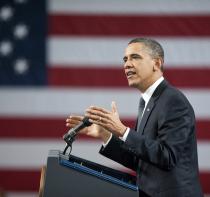
UNIVERSITY PARK – U.S. President Barack Obama touted the importance of Penn State’s research efforts in moving the nation toward a clean energy future in a talk delivered Thursday, Feb. 3, at the Recreation Building on the University Park campus.
The president unveiled the Better Buildings Initiative, a plan to improve energy efficiency of commercial building space in the U.S. by 20 percent over the next nine years. Integral to that vision, he said, will be efforts such as those taking place at the Energy Innovation Hub for Energy Efficient Buildings at the Philadelphia Navy Yard, a federally funded research initiative led by Penn State.
“Right here at Penn State, a university whose motto is ‘Making Life Better,’ you’ve answered the call,” Obama told the crowd of about 3,000 students, faculty, staff and invited guests. “You’re preparing to lead the way on a hub that will make America home to the most energy-efficient buildings in the world.”
Penn State has more than 500 researchers working in the areas of energy and the environment. During his visit, the President toured the Architectural Engineering Structures Lab and the Mechanical Systems and Indoor Environment Laboratory, where research related to improving the efficiency of buildings already is under way.
At the Philadelphia Navy Yard, more than 90 organizations are involved in the development of innovative technologies that will improve the energy efficiency of commercial and residential buildings. A Clean Energy Campus will be developed there as a proving ground for technologies that will help the nation to reduce overall building energy consumption by 50 percent to 80 percent. Obama said it is his goal, through the Better Buildings Initiative, to make the United States home to the most energy-efficient buildings in the world.
“Now, (improving building efficiency) may not sound too sexy until you realize that our homes and businesses consume 40 percent of the energy we use,” Obama said. “The good news is, we can change all of that. Making our buildings more energy-efficient is one of the fastest, easiest and cheapest ways to save money, combat pollution and create jobs right here in the United States of America.”
The entire effort, known as the Greater Philadelphia Innovation Cluster (GPIC), is expected to generate thousands of quality jobs in the greater Philadelphia region, and lead to more economic growth as innovative new technologies are implemented across the country. The hub in Philadelphia is one of three across the country working improve efficiency in the areas of solar and nuclear energy, and building efficiency.
“The discoveries made on (the Clean Energy Campus) will lead to jobs in engineering, manufacturing, construction, installation and retail,” Obama said. “They’ll be more than jobs that help support families, they’ll be jobs with a national purpose; jobs that make our economy smarter, make our planet safer and help America maintain its competitive edge in the 21st Century.”
Obama said the innovations born at Penn State and other GPIC member organizations will lead to continued economic prosperity for future generations of Americans.
“What this University is going to lead will be more than a pioneering research center or an economic engine for Pennsylvania and America for years to come: what you’re going to do is lead a modern-day incubator for what sets us apart – the greatest force that the world has ever known – and that is the American ideal. If you remember that, and keep breaking new ground and we as a country keep investing you, I’m confident that America will win the future in this century, just like we did in the last.”
If the goals of the Better Buildings Initiative are met, Obama said the nation’s businesses could be saving nearly $40 billion annually on energy bills by 2020. “That’s money that could be spent growing those businesses and hiring new workers,” he said. Obama said the plan would be paid for by a variety of tax incentives and financial opportunities, and by ending existing subsidies for gas and oil companies.
To see photos from the president’s speech, visit http://live.psu.edu/stilllife/2420 and http://live.psu.edu/stilllife/2421 online. For more information about the Greater Philadelphia Innovation Cluster, visit http://gpichub.org/ online. For information about Penn State’s involvement in the GPIC hub, visit http://live.psu.edu/story/48253 online. To read the full text of the president’s speech, visit http://live.psu.edu/story/51187 online.
L. Reidar Jenson